Related Research Articles
Hate speech is defined by the Cambridge Dictionary as "public speech that expresses hate or encourages violence towards a person or group based on something such as race, religion, sex, or sexual orientation". Hate speech is "usually thought to include communications of animosity or disparagement of an individual or a group on account of a group characteristic such as race, colour, national origin, sex, disability, religion, or sexual orientation". Legal definitions of hate speech varies from country to country.
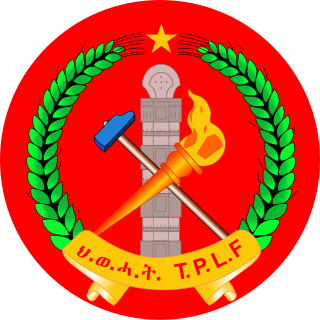
The Tigray People's Liberation Front (TPLF) is a left-wing ethnic nationalist paramilitary group, banned political party, former ruling party of Ethiopia, and designated as a terrorist organization by the Ethiopian government. It is widely known as Woyane, or Wayane in older texts and Amharic publications.

Tigray Province was a historical province of northern Ethiopia that overlayed the present day Afar and Tigray regions. It encompassed most of the territories of Tigrinya-speakers in Ethiopia. Tigray was separated from the northern Tigrinya speaking territories by the Mareb River, now serving as the state border to Eritrea.

Tigrayans are Semitic-speaking ethnic group indigenous to the Tigray Region of northern Ethiopia. They speak the Tigrinya language, an Afroasiatic language belonging to the Ethiopian Semitic branch.

Abiy Ahmed Ali is an Ethiopian politician who has been the 4th prime minister of the Federal Democratic Republic of Ethiopia since 2 April 2018. He was the third chairman of the Ethiopian People's Revolutionary Democratic Front (EPRDF) that governed Ethiopia for 28 years and the first Oromo in that position. Abiy is an elected member of the Ethiopian parliament, and was a member of the Oromo Democratic Party (ODP), one of the then four coalition parties of the EPRDF, until its rule ceased in 2019 and he formed his own party, the Prosperity Party. He won the 2019 Nobel Peace Prize for his work in ending the 20-year post-war territorial stalemate between Ethiopia and Eritrea.
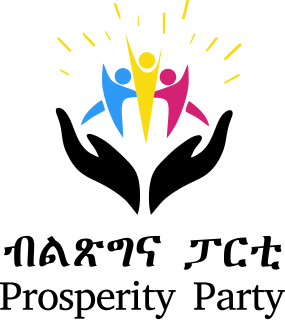
The Prosperity Party is a political party in Ethiopia that was established on 1 December 2019 as a successor to the Ethiopian People's Revolutionary Democratic Front (EPRDF) by incumbent Prime Minister Abiy Ahmed. The merger into a countrywide party is part of Abiy's general policy of distancing the country's politics from ethnic federalism. It ran for the first time in the 2021 general election.
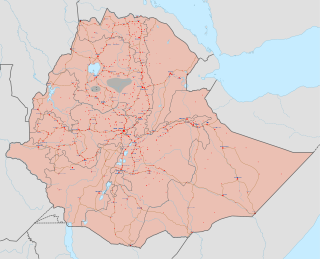
The Tigray War is an ongoing civil war that began on 3 November 2020 in the Tigray Region of Ethiopia. The local Tigray Defense Forces (TDF) are fighting the Ethiopian National Defense Force (ENDF), the Ethiopian Federal Police, regional police, and gendarmerie forces of the neighbouring Amhara and Afar regions with the involvement of the Eritrean Defence Forces (EDF). All sides, particularly the ENDF, EDF, and TDF have committed war crimes during the conflict. Due to the onset of the war, a deep humanitarian crisis has developed. On 24 March 2022, the Ethiopian government declared an indefinite humanitarian truce, in order to allow the delivery of humanitarian aid into Tigray. On 25 April, 2022, the spokesperson for TPLF, Getachew Reda, told Reuters that they have completely withdrawn their troops from neighboring Afar region, in hopes of humanitarian aid entering the Tigray Region.
The Transitional Government of Tigray was a caretaker administration that was formally declared by the House of Federation of Ethiopia on 7 November 2020, in the context of a conflict between the Tigray People's Liberation Front (TPLF), in power in the Tigray Regional State and the federal government of Ethiopia. In late November 2020, the administration, headed by Mulu Nega, planned public consultation and participation in choosing new leaders at the regional and zonal level and preservation of woreda and kebele administrations.
Ethnic discrimination in Ethiopia during and since the Haile Selassie epoch has been described using terms including "racism", "ethnification", "ethnic identification, ethnic hatred, ethnicization", and "ethnic profiling". During the Haile Selassie period, Amhara elites perceived the southern minority languages as an obstacle to the development of an Ethiopian national identity. Ethnic discrimination occurred during the Haile Selassie and Mengistu Haile Mariam epochs against Afars, Tigrayans, Eritreans, Somalis and Oromos. Ethnic federalism was implemented by Tigray People's Liberation Front (TPLF) leader Meles Zenawi and discrimination against Amharas, Oromos and other ethnic groups continued during TPLF rule. Liberalisation of the media after Abiy Ahmed became prime minister in 2018 led to strengthening of media diversity and strengthening of ethnically focussed hate speech. Ethnic profiling targeting Tigrayans occurred during the Tigray War that started in November 2020.
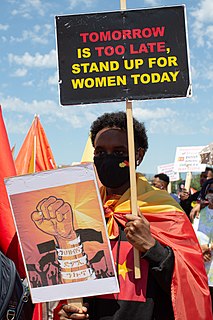
Sexual violence in the Tigray War included, according to the United Nations Special Representative on Sexual Violence in Conflict, Pramila Patten, people forced to rape family members, "sex in exchange for basic commodities", and "increases in the demand for emergency contraception and testing for sexually transmitted infections". As of August 2021, the number of rape victims ranged from a minimum estimate of 512–516 rapes registered with hospitals in early 2021 to 10,000 rapes according to British parliamentarian Helen Hayes and 26,000 women needing sexual and gender-based violence services according to the United Nations Population Fund. Several claims have made implicating both sides of the conflict in the systematic use of rape as a weapon of war against the civilian population.

War crimes have been committed during the Tigray War that started in November 2020.

The Tigrayan peace process is a series of proposals, meetings, agreements and actions that aim to resolve the Tigray War. Around 9 November 2020, Tigray People's Liberation Front (TPLF) and Tigray Region leader Debretsion Gebremichael asked the African Union to stop the war and requested peace negotiations; Ethiopian Prime Minister Abiy Ahmed refused to negotiate. On 25–27 November, a trio of former African presidents appointed by African Union chair Cyril Ramaphosa visited Ethiopia with the aim of mediating; they met Abiy and representatives of the Transitional Government of Tigray that officially replaced the elected TPLF Tigrayan government. An emergency Intergovernmental Authority on Development summit of East African heads of government and state met on 20 December 2020 in Djibouti, resulting in a statement of support for the Ethiopian constitutional order and humanitarian access to Tigray Region.
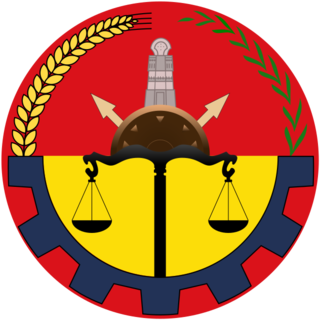
The Tigray Defense Forces, colloquially Tigray Army are a military structure that came into existence during the Tigray War. The TDF is experienced with guerrilla warfare. Amnesty International and the Human Rights Watch have reported that TDF soldiers have partaken in gang rapes and extrajudicial killings of civilians during their occupation of the Afar and Amhara regions. According to the Ethiopian Ministry of Justice TDF soldiers have been found responsible for at least 540 civilians deaths by 28 December 2021.

Many of the roots of the ongoing civil conflict within Ethiopia date back to the mid-twentieth century and earlier. Following the 2018 dissolution of the ethnic federalist, dominant party political coalition, the Ethiopian People's Revolutionary Democratic Front, there was an increase in tensions within the country, with newly resurgent regional and ethnically based factions carrying out armed attacks on military and civilians in multiple conflicts throughout Ethiopia.

The EHRC–OHCHR Tigray investigation is a human rights investigation launched jointly by the Ethiopian Human Rights Commission (EHRC) and the Office of the United Nations High Commissioner for Human Rights (OHCHR) in mid-2021 into human rights violations of the Tigray War that started in November 2020. The EHRC–OHCHR joint investigation team's report was published on 3 November 2021.

The 2021–2022 Ethiopian state of emergency was issued by the Ethiopian Government on 2 November 2021 and put into effect on 5 November by the Ethiopian parliament, which acted the bill from the executive government of the country into law. The six month state of emergency grants federal authorities "sweeping powers to arrest and detain critics, impose curfews and restrict the news media" as well as conscript any citizen over 18 to fight in the Tigray War.

The TDF–OLA joint offensive was a series of military battles starting in late October 2021 opposing a coalition of the Tigray Defense Forces (TDF) and Oromo Liberation Army (OLA) against the Ethiopian National Defense Forces (ENDF) in the context of the Tigray War and the Oromo conflict. The TDF and OLA took control of several towns south of Tigray Region in the direction of the Ethiopian capital Addis Ababa in late October and early November. Claims of war crimes included that of the TDF extrajudicially executing 100 youths in Kombolcha, according to federal authorities.
Predictions of a genocide in Ethiopia of Tigrayans, Amharas and Oromos, in the event of the TDF–OLA joint offensive leading to the Tigray People's Liberation Front–Oromo Liberation Army coalition taking over Addis Ababa, were made in late November 2021.

Abiy Ahmed became Prime Minister of Ethiopia since 2 April 2018, and chairman of the Ethiopian People's Revolutionary Democratic Front (EPRDF), from 2018 until its dissolution in 2019, replaced by the Prosperity Party.

The Amhara genocide is an ongoing systematic massacre of ethnic Amhara and Agew people in Ethiopia since 1990. Large-scale killings and grave human rights violations followed the implementation of the ethnic-federalist system in the country. In most of the cases, the mass murders were silent with perpetrators from various ethno-militant groups- from Tigray TPLF or TDF, Oromo OLF -OLA, Shene/Shane (ሸኔ),Oneg (ኦነግ) which are also known as Shene or Oneg, and the Gumuz armed groups. Ethnically motivated attacks against the Amhara have been reported. with mass graves continuously discovered in various locations. Many from the victim side stated that attempts to investigate and to uncovering data expose them to various forms of persecution. However, the results of two consecutive National Census Analyses and a report by the State revealed that over 2 million Amhara could not be traced. The figure reflects the decades-long massacres and enforced disappearances of the Amhara people. From the ongoing nature of the violence, the actual number is expected to be higher.
References
- ↑ "Hate speech".
- 1 2 Cotler, Irwin (2012). Herz, Michael; Molnar, Peter (eds.). "State-Sanctioned Incitement to Genocide". The Content and Context of Hate Speech: 430–455. doi:10.1017/CBO9781139042871.030. ISBN 9781139042871.
- 1 2 3 de Waal, Alex (2021-09-17). "The world watches as Abiy loses it — and risks losing Ethiopia, too". World Peace Foundation . Archived from the original on 2021-09-21. Retrieved 2021-11-17.
- ↑ Nockleby, John T. (2000), "Hate Speech" in Encyclopedia of the American Constitution, ed. Leonard W. Levy and Kenneth L. Karst, vol. 3. (2nd ed.), Detroit: Macmillan Reference US, pp. 1277–79. Cited in "Library 2.0 and the Problem of Hate Speech," by Margaret Brown-Sica and Jeffrey Beall, Electronic Journal of Academic and Special Librarianship, vol. 9 no. 2 (Summer 2008).
- ↑ "Uganda genocide: A nightmare finally comes to an end". 10 January 2014.
- ↑ Dozier, Kimberly (10 February 2020). "Saudi Arabia Rebuffs Trump Administration's Requests to Stop Teaching Hate Speech in Schools". Time.
- 1 2 Gebremeskel, Gebrekirstos (2020-12-18). "The war on Tigray: A multi-pronged assault driven by genocidal undercurrents". Ethiopia Insight . Archived from the original on 2021-09-22. Retrieved 2021-11-17.